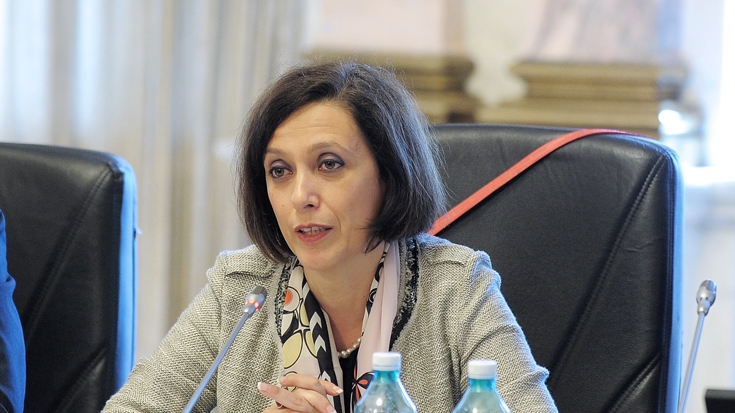Good morning
Minister Cazanciuc,
Chairman Ciuca,
President Bordea,
Ladies and Gentlemen,
I am happy to be here today and participate in the presentation of the Insolvency and Creditor/Debtor Rights assessment for Romania. This study was prepared by the World Bank (WB) as part of a wider framework of Reports on the Observance of Standards and Codes.
This event illustrates well the multiple roles of the World Bank and the impact the Bank’s work can have on our client countries institutional improvement.
The Standards and Codes Initiative was launched 15 years ago as a joint effort by the International Monetary Fund (IMF) and the World Bank. It aimed at strengthening the international financial architecture and promoting greater financial stability at both domestic and international levels through development, dissemination, adoption and implementation of international standards and codes. It focused on areas such as transparency, financial sector regulation and supervision, and market integrity.
Over the last fifteen years hundreds of standards assessment reports have been prepared and made public by the IMF and WB. For Romania, such prior reports covered Accounting and Auditing, Corporate Governance, Data Dissemination, Fiscal Transparency and Banking Supervision.
Some of these reports were prepared in the early 2000s and require update but they fulfilled a very important role at the time of their completion. As they provide a benchmark for assessing national rules and practices, and allow identify vulnerabilities, and guide policy reforms. For example, the Accounting and Auditing report supported Romanian authorities and professional bodies in modernizing domestic accounting practice, while the Banking Supervision report helped the National Bank of Romania improve the regulatory framework.
These reports also contribute to enhanced transparency and multilateral surveillance at the international level. They help better identify weaknesses that may contribute to economic and financial vulnerability and foster market efficiency and discipline.
The Insolvency and Creditor/Debtor Rights Regime assessment in Romania, which is being presented today, was initiated as a technical assistance financed by the World Bank for the Ministry of Justice. We compared the insolvency and creditor debtor regimes in Romania with international best practices and complemented an assessment of the internal legislation on insolvency performed by the Insolvency Code consortium.
Both reviews were prerequisites for a sound reform of the insolvency legislation.
The International Monetary Fund also acknowledged the need for reform in the Insolvency regime in the Letter of Intent agreed with the Romanian Government.
I must say that the assessment proved to be especially timely.
The economic and financial crisis that affected Romania in 2009 raised the proportion of non-performing loans in Banks’ portfolio to critical levels and hence increased the number of insolvencies, requiring the country to provide a new, urgent response to the issue of insolvency.
As a result, the Ministry of Justice also initiated in 2013 a new insolvency law that was demanded for some time by many of the stakeholders present in the Romanian market. The World Bank specialists’ team had the opportunity to comment on the draft legislation and I was happy to see that is Insolvency and Creditors Rights Report and our comments on the draft law, added substance to the professional debate in the Parliament commissions where the new legislation was examined.
Clearly, the impact of the recommendations on the Observance of Standards and Codes can take many years to be fully felt.
In Romania’s case, most of our expert’s team recommendations have been taken on board by the Authorities and we expect to see soon the effects of an improved legal and regulatory framework for enterprise credit.
In particular, the financial sector would be strengthened by the implementation of reforms to the insolvency, pre-insolvency and risk management frameworks, and this could help tackle the high level of non-performing loans.
But a better regulatory framework is only the first step towards an effective insolvency process and much depends on the implementation and constant modernization of the institutional setup, based on feed-back from the practice.
The effectiveness of the insolvency process also depends on other institutions which, in order to be effective, need to reform and enhance their mutual collaboration.
In particular, the land registry needs important improvements, the auction process for claims enforcement is unnecessarily lengthy, courts are often over-burdened and need more training, especially on basic accounting, finance and economics. The World Bank is already involved in some other major reform projects, such as that of the cadaster system. This could have a positive impact on the insolvency process.
The event today is a first step for the dissemination and training of some of the main stakeholders, but certainly much remains to be done.
In conclusion, I would like to thank the organizers: the Ministry of Justice – Mr. Minister and his technical team led by Mr. Judge Motiu, and the Judicial Commission of the Chamber of Deputies, Mr. President Ciuca.
I would also like to extend my gratitude to all stakeholders that have provided comments to the report thus ensuring a balanced assessment. Allow me to quote a few, the Romanian Banking Association, The Superior Council of Magistracy, the National Bank of Romania, the Ministry of Public Finance, the Cadaster Agency and of course the business environment representatives.
The Report on Standards and Codes and the next steps recommended in the action plan of the report, create the conditions for continuing the comprehensive reform in the legal framework, aimed at providing Romania with a friendly business environment, adapted to the EU single market. I invite you to carefully review and discuss today the recommendations, with a particular focus on implementation.

